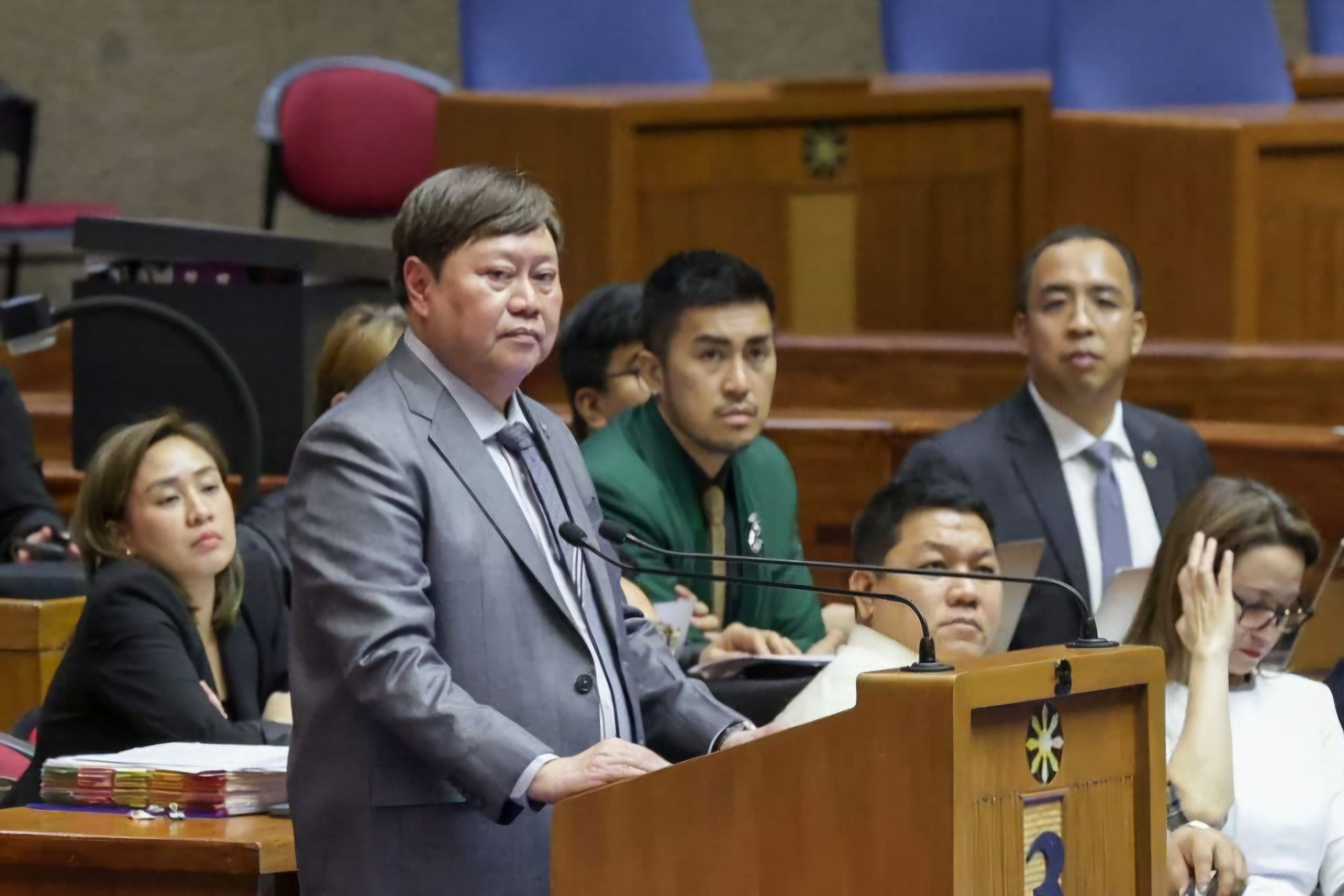Big discrepancy in rice importation records could betray deeper systemic woes--Suansing
At A Glance
- Sultan Kudarat 2nd district Rep. Horacio Suansing Jr. is prodding the Bureau of Internal Revenue (BIR) and the Philippine Competition Commission (PCC) to coduct investigations to deteemime accountability and transparency in the rice importation process.
 Sultan Kudarat 2nd district Rep. Horacio Suansing Jr. stands at the podium on the plenary floor. (Facebook)
Sultan Kudarat 2nd district Rep. Horacio Suansing Jr. stands at the podium on the plenary floor. (Facebook)
Sultan Kudarat 2nd district Rep. Horacio Suansing Jr. is prodding the Bureau of Internal Revenue (BIR) and the Philippine Competition Commission (PCC) to coduct investigations to deteemime accountability and transparency in the rice importation process.
This, after Suansing exposed during the House quinta-committee (quinta-comm) the supposed big discrepancies in rice importation records involving Davao-based businessman Stewart Santiago and his companies, Nance II AgriTraders, and Davao Solar Best Corporation.
The quinta-comm, also known as the Murang Pagkain Super-committee, is currently probing rice importers amid concerns of irregularities that negatively affect market stability and government revenues.
Suansing’s revelations were among the key points raised during Wednesday’s hearing, where he highlighted mismatched data between the Bureau of Customs (BOC) and the Bureau of Plant Industry (BPI).
While the BPI issued Sanitary and Phytosanitary Import Clearances (SPSICs) for only 48,852 metric tons (MT) in 2022, BOC records showed that Santiago’s companies imported a total of 348,011 MT.
“Per BOC records, Nance II and Davao Solar Best imported a total volume of 348,011 MT. But the problem, Mr. Chair, as per BPI data, they were only issued SPSICs for 48,852 MT. There is a discrepancy of 299,159 MT. Hindi ito nadeklara. May discrepancy (This wasn't declared. There's a discrepancy),” Suansing pointed out during the hearing.
The Mindanao solon underscored that such irregularities could reflect deeper systemic issues in import regulation, and potentially enable large-scale misdeclarations and abuse of government-issued clearances.
“‘Para sa akin, Mr. Chair, kailangang ayusin ito (For me, Mr. Chair, this must be fixed),” he stressed.
Suansing also asked Santiago on whether his companies were paying the correct taxes.
Records presented at the hearing showed that Nance II AgriTraders and Davao Solar Best paid P2.8 billion in duties and taxes in 2023, with smaller amounts in prior years.
Santiago claimed his companies operate on slim margins of P1 to P1.50 per kilogram of imported rice, relying on high volumes for profitability.
“Per our record, in 2021 and 2022, your two companies paid only P650 million in duties and taxes. In 2021, you paid P1.6 billion. In 2022, you paid P2 billion. In 2023, it’s P2.8 billion,” Suansing noted.
“Kung piso lang ang kita per kilo, patingnan natin sa BIR kung ang piso na ‘yan, deklarado (If only one oeso was the profit per kilo, let us check with the BIR if that one peso was duly declared),” Suansing said, as he urged the tax bureau to verify the accuracy of the companies’ financial declarations.
BIR representatives assured the quinta-comm that they had been actively reviewing tax records of major rice importers and would recommend appropriate actions based on their findings.
Suansing also grilled the Department of Agriculture (DA) and the BPI for lapses in monitoring rice imports. The BPI is under the auspices of the DA.
He cited automatic SPSIC approvals during the previous administration as a potential enabler of irregularities, such as the recycling of import permits.
While DA officials acknowledged that automatic approvals may have contributed to discrepancies, Suansing dismissed this as an insufficient explanation for the significant mismatch in import data.
Giving an idea of Santiago’s influence in the rice market, Suansing noted that Nance II AgriTraders and Davao Solar Best collectively control about 10 percent of the country’s rice imports.
He called on the PCC to investigate potential anti-competitive behavior by the companies. The agency committed to review the companies’ activities and submit their findings to the committee.
In concluding his interpellation, Suansing underscored the importance of addressing these irregularities to protect consumers and stabilize the rice market.
The quinta-comm is expected to hold follow-up hearings to ensure proper oversight and formulate stricter policies on rice importation.